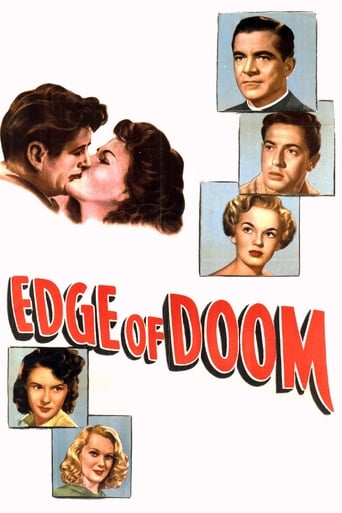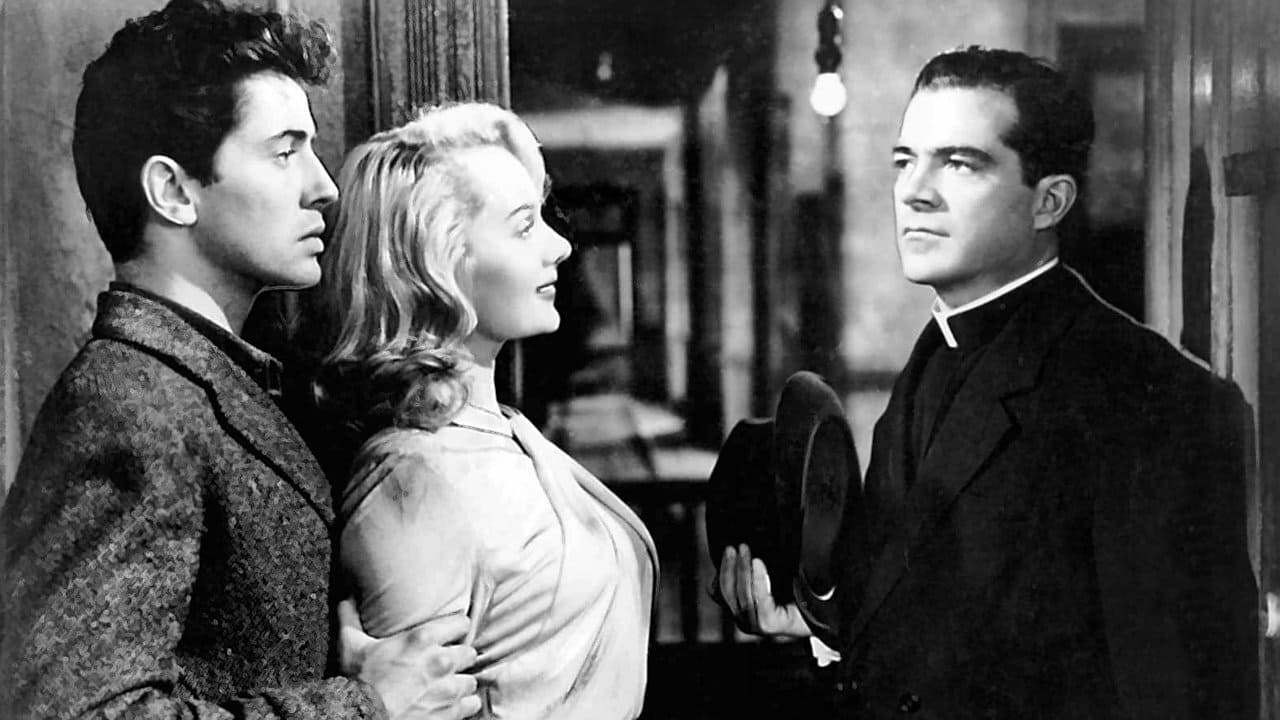LeonLouisRicci
Considered one of the most Bleak, Depressing, Gloomy, Brooding, but Ultimately Unsuccessful in the Genre of Film-Noir. Unsuccessful at the Box Office and Unsuccessful, but Not Completely with Critics and Fans.It's a Troubled Subject and it was a Troubled Production. The Subject of "Religion" in Motion Pictures in the "Code" Era was Scrutinized as much as Anything from the "Overseers/Big Brother" Censors with Hays Hubris and Nothing Slipped by that wasn't "Christian" Friendly.So this Story of a Young Man who was Dissed by the Church and wouldn't give His Father a "Decent" Burial because of Suicide and the Trauma that Followed was Suspect. But that's just the Pro-Log. His Mother than Succumbs to TB, Dies, and the Trauma is Repeated. Not because of Suicide but because He and His Mother are Ghetto Dwelling Poor.What Ensues is a Film that had to be Pulled and "Softened" with "Book-Ending" New Scenes.The Movie is as Dark as Noir can get with its Relentless Display of an Uncaring and Ugly World, especially if You don't have Money. Audiences at the Time would have none of it and the "Money-Men" at the Studios Shunned the mere Existence of the Film and it Languished in Limbo for Years.The Star, Farley Granger Bad Mouthed the Movie any chance He got and the Film Remained Unrecognized for Decades. Dana Andrews, Paul Stewart and the rest of the Fine Cast all Add to the Agonizing Atmosphere and the Movie Stands on its own. Noble, but Flawed by Fawning Concerns that were Against the Grain of the Source Material.When Viewed Today, it can Showcase Societal Attitudes about Organized Religion, Pulverizing Poverty, and a Studio System, like American Lower Class Life, that was in Dire Need of Liberal Reform in a Post War America that was Showing its Capitalistic Muscle.
bkoganbing
One of the reasons that I liked Edge Of Doom is the fact that Catholic priests are portrayed as human. In that the contrast in the behavior of Dana Andrews and Harold Vermilyea is the key to the film, not withstanding the performance of Farley Granger as the protagonist, a sensitive troubled youth driven to rage and murder.Harold Vermilyea is a thirty year veteran of the skid row parish he's been assigned to. Faces have changed, but conditions haven't and he's seeing that his religious message hasn't brought much change. He's suffering from the very human condition of burnout. So when Farley Granger who has a history with the church consisting of his father not being given a Catholic funeral because he was a suicide comes to Vermilyea asking for a big celebratory funeral for his mother who was a believer who never lost faith and being told no, the rage takes over him. He clubs Vermilyea with a heavy crucifix and kills him.Vermilyea is having a family crisis of his own, his niece has run off with a divorced man and is having a civil ceremony because the church won't marry them. He was also bound by Catholic rules not to give Granger's father a Catholic rite because of those selfsame rules. All that Granger doesn't know and when we seek guidance from clergy in any faith we never know what's in their background that could affect their actions with us.Anyway Granger spends the rest of the film with a troubled conscience which Dana Andrews suspects, but can't really prove. Since he hasn't come to him in confession there's no vow of silence unlike O.E. Hasse who tormented Montgomery Clift with that in I Confess. So Andrews is free to help the police investigation which is headed by Robert Keith.But Andrews is a priest in the best G.K. Chesterton tradition, as much concerned with Granger's soul as with solving the case. That's his dilemma. You can also see that he looks at Vermilyea and thinks that this could be him in another twenty years.Edge Of Doom is one of the bleakest noir films ever made. It offers no solutions to any problems. People seemed bound by fate and trapped by the dogma they believe. Some similar themes in a secular vein were also expressed in the Humphrey Bogart film Knock On Any Door which came out a year earlier with Bogart as an attorney and John Derek a young client who has a lot of history and baggage. It's a fine film, but prepare yourself for a real downer.
donwc1996
I kinda liked this film--maybe it was the cast more than anything. The script was a bit lame @ x's. the author's son makes some comments that indicate that the book was deeper or something--but when a book is sold to Hollywood--the author gives up ownership, so to speak. this film came out in 1950 & 57 years later the son still sounds sore. Meanwhile, the book is like totally unavailable so a modern viewer of the film would be hard pressed to make comparisons. Anyhow, I thought that Farley Granger did an excellent job ( despite his negative views on the film). Also excellent were Paul Stewart, Mala Powes and Robert Keith. Joan Evans was given nothing to do & Dana Andrews was good--but the character was not written well.
songwarrior52
My dad wrote the book that EOD is based on. It is interesting to me that a film that was declared a resounding failure still elicits some interesting commentary. The view that it is possibly the most depressing noir-type film around sounds like a huge compliment to me, given what noir is always striving to do, and indeed it IS a dark film (which makes the above comment about the Stradling cinematography kind of puzzling). Also, the IMDb trivia statement that the film has never been shown on TV can't possibly be true, since I remember seeing it on TV when I was a teen.The novel Edge of Doom used a Crime and Punishment narrative style to tell a contemporary murder story revolving around poverty in a large American citythe template was Philadelphiaand to raise issues about how devotion to church alone can not solve the ills of a modern society. The subject matter is indeed bleak, and indeed ahead of its time. It's certainly a brooding tale, but the novel as literature was considered significant in its day. How Goldwyn came to produce it as a film is a story unto itself, but there can be no doubting that if the film's creative team had stuck to their noir-ish guns, and focused more artfully on the message, it would have been a much better film, not to mention a film that might've actually raised noir above its melodramatic station. (Noir is great, of course, and it's fun to view its style, but a lot of the entries in the genre are tough to watch nowadays, simply because the dialogue is so corny.) Bookending the movie with the corny priest scenes ruined the film's chance to actually probe the poverty theme with seriousness. By soft-pedaling its style, Mark Robson and Philip Yordan failed to capture what was important about the novel. Here was yet another example of Hollywood so afraid of box-office impact that they made a difficult situation worse, when what they might've had was a critically well-received work that would have also failed at the box office but at least might've been counted as art.I can't say I agree with the above post that hails the work of Farley Granger. Granger has been publicly vitriolic about the movie, but in my view he did nothing to help it. He's wooden and self-conscious, and, let's face it, he was never a good actor even when Hitchcock directed him. However, I am also open to the possibility that, had Robson had any conceptual idea about how to best tell this tale, Granger might've made for an interesting screen subject. The Yordan screenplay tweaks trivialized the message and shortchanged the potential for a visual style. Even then, if Robson had brought a creative approach to things, even the screenplay issues might've been overcome.EOD the film remains a historical curiosity, but it's mostly an example of what happens when unsympathetic, apparently clueless, filmmakers are hired to tackle a subject of seriousness, which they can only reduce to cinematic hackwork. It could have been, it SHOULD have been, a much better movie.


 AD
AD



